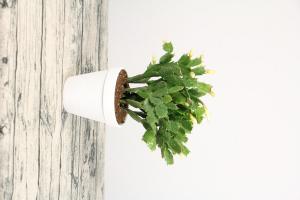How to Care for a Foliage Plant
Foliage plants are a great addition to any home or office space, as they add a touch of natural beauty and help purify the air. However, taking care of these plants requires some knowledge and effort to ensure they thrive. In this article, we will discuss some tips for caring for your foliage plant.
Choosing the Right Location
One of the most important aspects of caring for a foliage plant is choosing the right location for it. These plants typically prefer bright, indirect light, but can also tolerate lower light conditions. Additionally, they should be kept away from drafty areas and extreme temperatures, as this can cause stress and damage to the leaves.
Watering and Fertilizing
Watering is also crucial when caring for a foliage plant. It is important to ensure that the soil is consistently moist, but not waterlogged, as overwatering can lead to root rot. On the other hand, underwatering can cause the leaves to wilt and eventually dry out.
Fertilizing your foliage plant is also important for promoting healthy growth. It is recommended to use slow-release fertilizers or to fertilize once a month during the growing season.
Pruning and Cleaning
Regular pruning and cleaning are essential for keeping your foliage plant healthy and attractive. Dead or yellowing leaves should be removed to prevent the spread of disease, and pruning can also help promote new growth and maintain the plant's shape.
Cleaning your foliage plant is also important for maintaining its health and appearance. Dust and debris can accumulate on the leaves, which can prevent the plant from properly absorbing light and air. Gently wiping the leaves with a damp cloth can help remove any dirt or dust.
Troubleshooting Common Problems
Despite your best efforts, your foliage plant may experience some problems, such as pests or diseases. It is important to regularly inspect your plant for any signs of damage or diseases, such as brown spots or wilted leaves.
If you do discover a problem, it is best to take action immediately to prevent further damage. In many cases, simply removing the affected leaves or cleaning the plant can help solve the problem. However, more serious issues may require the use of a pesticide or fungicide.
In conclusion, taking care of a foliage plant requires some effort, but the rewards are well worth it. By choosing the right location, watering and fertilizing properly, pruning and cleaning regularly, and troubleshooting any problems that may arise, you can enjoy a healthy and beautiful plant for years to come.

 how many times do yo...
how many times do yo... how many planted tre...
how many planted tre... how many pine trees ...
how many pine trees ... how many pecan trees...
how many pecan trees... how many plants comp...
how many plants comp... how many plants can ...
how many plants can ... how many plants and ...
how many plants and ... how many pepper plan...
how many pepper plan...






























